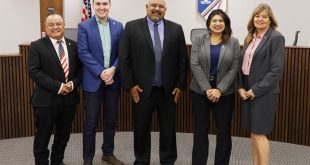California will face a big change in medical coverage beginning next year that will impact a lot of seniors and low-income residents so there needs to be more outreach and support.
With the expansion of Medi-Cal to include all undocumented immigrants as of Jan. 1st, 2024, and new services aimed at meeting not just individual but community healthcare needs, California is transforming public healthcare.
In a recent media briefing by Ethnic Media Services,
Medi-Cal state staff and ground-level community health center workers discussed the latest data on redetermining Medi-Cal eligibility (known as redetermination), the transition in 21 counties to new managed health care plans, and expanding Medi-Cal to all undocumented immigrants as of Jan. 1st.
The Department of Health Care Services (DHCS) is committed to ensuring that all eligible Californians can get Medi-Cal coverage for themselves and their families. Beginning January 1, 2024, a new law in California will allow adults ages 26 through 49 to qualify for full Medi-Cal, regardless of immigration status.
More than a quarter million undocumented Californians aged 50 and older received full-scope, comprehensive Medi-Cal health coverage after the Legislature’s and Governor Newsom’s action in July 2021.
DHCS announced that roughly 286,000 older adult Californians are receiving full-scope Medi-Cal thanks to the expansion of comprehensive preventive care and other services to all income-eligible adults 50 years of age and older, regardless of immigration status.
Yingjia Huang, Assistant Deputy Director of Health Care Benefits and Eligibility, shared the latest data on who has stayed on Medi-Cal rolls and who is off 5 months into redetermination.
On the eve of unwinding, Medi-Cal had close to 16 million enrollees in CA, the highest ever. The pandemic had a lot to do with this., Huang said. With that public health crisis ending, Medi-Cal had to redetermine eligibility.
DHCS released a public dashboard to see where things stand in the redetermination process which is now at the midway point.
There were 15.2 million enrollees in Medi-Cal as of the end Sept, while 160,682 applications were received. Enrollment is ongoing through Jan 31. California has the biggest caseload in the nation, with up to one million cases per month going through the redetermination process, says Huang.
The dashboard offered data in a variety of categories, from how many remain enrolled, to how many have lost coverage, as well as key demographic data. Across California, approximately 21% of individuals have been disenrolled, says Huang, which is low compared to other states.
The disenrollment rate for children remains constant at about 14% per month, while for seniors there are larger disenrollment rates. Huang says this may be in part because of the difficulty of reaching older adults over 65.
“We are proud to report that we are holding steady as a state,” says Huang. More work needs to be done and this process will continue through May of 2024.
In addition, Hispanics continue to be the highest group in terms of disenrollment, followed by whites. Neither of these was unexpected, though, given these groups’ demographic representation.
Throughout their 12-month unwinding period, states will need to conduct a renewal of every beneficiary enrolled in their Medicaid and CHIP programs as of the end of the month before their unwinding period. States that have a more even distribution of renewals for a year are better able to maintain a workload that is sustainable in future years, thereby enabling the state to avoid renewal backlogs and reduce the risk of inappropriate terminations. The volume of renewals and other eligibility actions that states will need to initiate during the 12-month unwinding period creates the risk that eligible beneficiaries will be inappropriately terminated. This risk is heightened in states that intend to initiate a large volume of their total caseload in a given month during the unwinding period, particularly if a state initiates more than 1/9 of its total caseload in a given month.
Michelle Retke, Chief of Managed Care Operations with DHCS spoke on the changes to managed care systems. In every county in California, there are managed care plans available. Starting next year, changes are coming to what plans are operating.
Members should expect multiple notices if changes to their plans are expected. In counties where multiple plans are available enrolees will get a choice packet to select the one that works best for them, says Retke.
Moving on from redetermination to Medi-Cal expansion, care will be made available to a wider range of age groups from 26 to 49 years of age starting in Jan. ’24.
Dr. Sergio Aguilar-Gaxiola, Professor of Internal Medicine, UC Davis and Director, UC Davis Center for Reducing Health Disparities. “I am very excited about the Medi-Cal expansion to include the undocumented. It is a tremendous need.”
There are 600-700k farmworkers in California with 850-900k dependents. 4 in 10 are undocumented. 2/3 speak little to no English, while 8% are of Indigenous origin. Outreach on the Medi-Cal expansion to this population is critical.
A study from the ’90s in Fresno found 1/3 of US-born respondents were using mental health services. That compares to 1/6 immigrants and less than 1/10 farmworkers, and this has gotten worse since the pandemic. Messaging to these populations will be a challenge.
“I am not sure if they will take advantage of this. It depends on how you communicate, says Aguilar-Gaxiola. “The onus is on us,” he says.
Another study found that almost 50% of respondents did not know where to go to find medical resources. Aguilar-Gaxiola stresses that you have to go to them, to where they work and congregate, and you have to do it outside work hours.
Overcoming language barriers is important as well. 8/10 Indigenous farmworkers speak neither Spanish nor English. “It requires more than goodwill… to reach these populations.”
Juan Avila of Garden Pathways in Bakersfield, a CBO that mentors and provides case management to youth and adults in the justice system.
Avila says healthcare access is very important to this population. Many discover health issues when seeking employment that requires care, but struggle with trust and language issues.
Avila adds that in 2017, AB720 allowed staff to enter local jails and detention centers to begin the enrollment process. With the current expansion, people leaving incarceration can activate their enrollment immediately.
Many people do not have the same address when they leave jail, so notices about Medi-Cal changes get lost. Avila says there’s a lot of work that needs to happen to ensure they are not dropped.
New services under the expansion are tattoo removal, as well as housing support, in essence, rounded health care that goes beyond just the doctor’s room. Violence intervention and aftercare for victims will also be covered.






